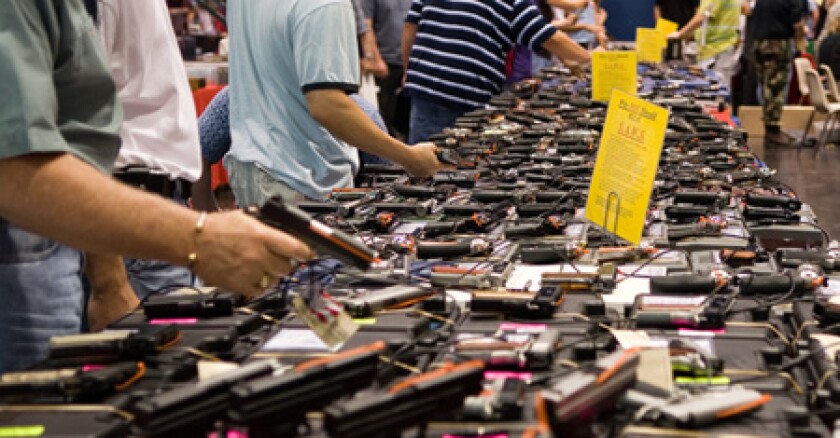As the national conversation continues on the sale of assault weapons and gun control, Democrats in the Arizona State Legislature plan to introduce bills in the next week that would close the state’s loophole on gun show sales.
“I think it’s a very reasonable proposal,” said Rep. Chad Campbell, D-Phoenix. “The intent of the gun law portion of my bills is to make sure that the wrong people don’t get guns. I do not want to impact responsible gun owners in Arizona.”
- Ban the sale, possession or transfer of ammunition clips with a capacity of more than 10 rounds;
- Repeal a state law that forces police departments to sell confiscated firearms to licensed dealers, rather than allowing police to destroy the weapons; and
- Require all private sales of assault weapons, even outside of gun shows, to be processed by a licensed dealer, including a background check.
Arizona is one of 33 states that do not require background checks for firearm sales at gun shows, according to the Coalition to Stop Gun Violence. At least one other state, Missouri, will consider tightening its law for gun show sales this year. State House Rep. Stacey Newman, D-St. Louis County, said she intends to introduce legislation next week to close Missouri’s loophole for all private firearm sales, including at gun shows and over the Internet.
The Gun Control Act of 1968 prohibits several categories of people from owning guns, including convicted felons, illegal drug users and people with severe mental illness who have been found to be legally insane or have been committed to a mental institution.
Background checks through the FBI or a state agency are designed to prevent potentially dangerous people from accessing guns. Federal law requires that licensed firearm dealers conduct these background checks on prospective buyers, keep a record of all gun sales, make those records available to law enforcement, report multiple sales and report the loss or theft of a gun from the dealer’s inventory. However, a 1986 law excludes vendors that sell guns only occasionally or do so from his or her private collection. The exemption has created a tier of gun sellers who do not have to follow federal backgrounding procedures, including at gun shows.
“The Internet is adding a new dimension to that process, too,” said Ben Van Houten, managing attorney at the Law Center to Prevent Gun Violence. Two states and the District of Columbia require universal background checks on all private gun transactions, not just at gun shows.
In a mass homicide in Wisconsin in 2012, the shooter obtained his .40 caliber handgun through ARMSLIST.com, which acts as a classifieds section for gun enthusiasts. It would have been illegal for a federally licensed vendor to sell him a gun because his wife had secured a restraining order against him. The same restriction did not apply to the website.
Newman, the Democratic representative from Missouri, said her bill is not likely to pass, though she expects to get at least 20 co-sponsors in her Progressive Caucus, including some gun owners. Republicans control Missouri’s State Legislature, with a veto-proof super majority in the House.
Last year, Arizona State Senator Steve Gallardo, D-Phoenix, tried to pass a law closing his state’s gun show loophole, but it died in committee with no co-sponsors. The proposal was so unpopular among legislators that no one in the state House, including Democrats, was willing to introduce a companion bill, Gallardo said.
Since 1997, Arizona Democrats have tried on three other occasions to close the gun show loophole. As with Gallardo’s bill last year, they all died in committee. Could this be the year the proposal becomes law?
“Probably not, but I think the legislature is ready to talk about it,” Gallardo said, noting that the mass killing at an elementary school in Newtown, Conn. had affected local politics even more than when former Congresswoman Gabby Giffords, a Tucson native, was shot in 2011.
“You’re seeing a tone that is much different,” Gallardo said. “Unfortunately it takes a Connecticut shooting to get elected officials to wake up.”
This week Democratic governors in New York, Colorado, Connecticut and Delaware announced they would pursue stricter gun control laws in their states. Only Gov. Tom Corbett, R-Penn., talked about gun shows specifically, though he backed off that proposal within a day.
Gun Show Laws Map
Source: Law Center to Prevent Gun Violence. Please zoom out to view Alaska and Hawaii
Laws for Background Checks at Gun Shows
|
|
Not required |
|
|
Required for handgun sales |
|
|
Required for all purchases |











